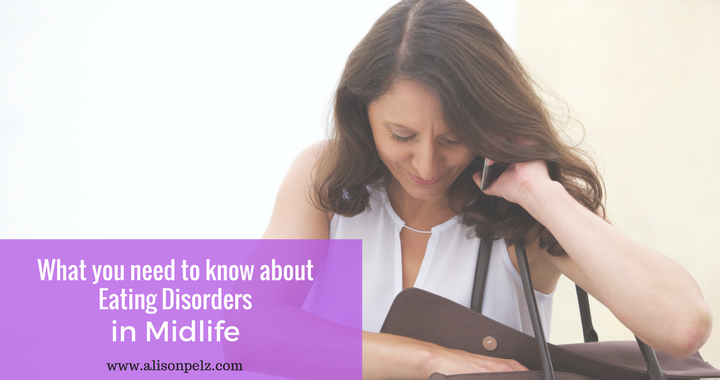Unfortunately, eating disorders in midlife are on the rise. Many eating disorders in adult women may go undiagnosed because of the mistaken belief that older women don’t develop eating disorders. It is true that adolescent girls are at a higher risk, but women of all ages are at risk for developing and maintaining an eating disorder.
Adult women usually present with eating disorders in the three following ways:
- An eating disorder was developed earlier in their life. That is, as an adolescent or young adult the individual developed her eating disorder, but never fully recovered. Adequate treatment, motivation to change, social & family support, etc. are all necessary for a full recovery.
- The second scenario is similar to the first, an eating disorder developed in adolescence or early adulthood and the individual fully recovered through treatment. But, then in midlife, a relapse took place either in response to environmental, social, psychological and/or physical stressors and the eating disorder returned.
- In this last scenario, which is the least common, is that the onset of the eating disorder first occurred in midlife. That is to say, the individual had no pre-existing eating disorder. The most common type of eating disorder that starts in mid-life is binge eating disorder (click here to learn more about binge eating disorder).
The Perfect Storm
Researcher postulate that girls and women are particularly vulnerable to developing an eating disorder during puberty and around menopause. During these times girls and women may experience sensitivity to estrogen shifts, increase in stress and body image disturbance. Like most mental health conditions, there are many reasons why an eating disorder develops. Risk factors include genetics, temperament, being female, history of dieting, drive for thinness, etc.
In regards to hormonal changes, researchers sight that girls and women who are highly sensitive to variations of estrogen may be at risk for developing an eating disorder. Both during puberty and around menopause estrogen levels are changing.
Secondly, stressors can contribute to a relapse or the development of an eating disorder. During adolescents, there are several normative pressures such as school, friendship, family, dating, etc. Women in midlife also experience a significant amount of demands including navigating career, marriage, loss of parents and family life, etc.
If you are a woman reading this, you have probably experienced societal pressure to be thin, fit, young and pretty. Drive for thinness is promoted throughout our institutions including in schools, workplace, social circles and in health care. Girls can experience puberty as an exciting, but confusing time. Worries about their bodies development and constant bombardment from the media & peers about how they “should look” are present. As women age, we are held to high societal standards of beauty despite our aging and changing bodies. We are sold products and procedures to make our bodies appear young again.
It is never too late to recover from an eating disorder, no matter what stage of life you are in. Eating disorders are treatable and with an experienced treatment team, people can fully recover.
What to do if you think you may have an eating disorder:
- Have hope. Eating disorders are treatable.
- Stop dieting. Dieting makes eating disorders worse.
- Seek professional help from an eating disorder specialist. Even if you have had treatment in the past with little success. As we age we have different motivating factors and circumstances that make recovery possible.
If you think you may have an eating disorder please call me for a free phone consultation at (512) 293-5770.
References:
- Eating disorders in midlife women: A perimenopausal eating disorder? By Jessica H. Baker, Cristin D. Runfola. Maturitas 85 (2016) 112-116.
- Understanding Body Image Dissatisfaction and Disordered Eating in Midlife Adults. By Sarah McGunnes, Joanne E. Taylor. New Zealand Journal of Psychology, Vol. 45, No. 1, April 2016.


